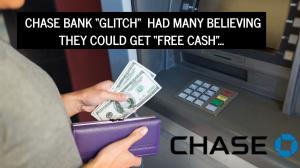
Banking Expert Witness Jason D. Koontz Offers Insight into Last Year’s Chase Bank 'Money Glitch' Incident
With legal fallout still unfolding, Koontz reflects on what the August 2024 incident reveals about operational risk in modern banking.
Chase ATM Fraud Incident (2024)
In August 2024, JPMorgan Chase faced a surge of fraudulent activity following a widely shared TikTok post that claimed users could withdraw free money by depositing fake or unverifiable checks through ATMs. The claim spread quickly across social media platforms—including a post on X (formerly Twitter) viewed over 7.5 million times according to entrepreneur.com—resulting in long lines at Chase ATMs in places like New York and other major cities as people tried to cash in on fraudulent checks.
This wasn't a technical error in the usual sense. Customers were taking advantage of a timing gap in the bank’s funds availability process, where ATM-deposited checks are credited before fully clearing. Many participants knowingly deposited bad or fictitious checks and immediately withdrew the funds before the checks were returned unpaid. Chase responded within days by locking affected accounts, reversing unauthorized credits, and flagging accounts with negative balances.
“This wasn’t a system failure—it was coordinated fraud amplified by social media,” said J.D. Koontz, a banking expert who serves as an expert witness in litigation involving financial institutions. “What made it dangerous was how fast it spread and how many people acted on what they thought was a victimless hack.”
In the months that followed, JPMorgan Chase began filing lawsuits in both federal and state courts against individuals and businesses who withdrew large sums—ranging from $80,000 to over $300,000—using this method. More recently, the bank expanded its legal efforts to include smaller-value cases under $75,000 in state courts across Georgia, Florida, New York, and Texas. According to CNBC, the bank also sent demand letters to over 1,000 customers, insisting they repay the misappropriated funds. Some recipients reportedly returned the money after receiving these notices.
Koontz emphasized that while the incident was rooted in fraudulent activity, it raises broader concerns about public misunderstanding of banking processes, as well as the speed at which social media can amplify risky behavior. “What we saw wasn’t just a criminal issue—it was a trust issue,” he noted. “People mistakenly believed this was a loophole in the system, when it was really check fraud in plain terms.”
The legal implications are ongoing. Chase has indicated it is also working with law enforcement, and that some participants attempting to discharge the debts through bankruptcy may still be held liable.
Koontz points out that while lawsuits against customers are rare, they’re justified when there is clear documentation of intentional fraud. “Banks don’t take legal action lightly,” he said. “But when there are documented transactions, viral video trails, and significant financial losses, it becomes necessary to protect the institution—and the system itself.”
Koontz continues to offer expert consulting and testimony in banking disputes, fraud and compliance matters.
About J.D. Koontz
J.D. Koontz is a nationally recognized banking expert witness and consultant with over 20 years of experience in commercial banking, financial operations, internal audit, and litigation support. He works with legal teams nationwide to provide testimony and advisory services in cases involving banking issues, risk management, and regulatory compliance.
Jason Koontz
Jason D. Koontz Expert Witness
+1 646-397-3835
email us here
Visit us on social media:
LinkedIn
Distribution channels: Banking, Finance & Investment Industry, Business & Economy, Culture, Society & Lifestyle, Law, Technology
Legal Disclaimer:
EIN Presswire provides this news content "as is" without warranty of any kind. We do not accept any responsibility or liability for the accuracy, content, images, videos, licenses, completeness, legality, or reliability of the information contained in this article. If you have any complaints or copyright issues related to this article, kindly contact the author above.
Submit your press release

